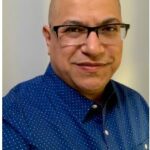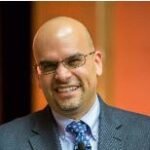DURHAM, NC– (Mar. 18, 2016) — A prestigious national research agency has awarded El Futuro $241,825 in funding to find ways to improve mental health treatment by better involving patients in research and applying the results.
El Futuro, which has offices in Durham and Siler City, is the first community organization in North Carolina to receive the Eugene Washington Engagement Award from the Patient-Centered Outcomes Research Institute (PCORI), based in Washington, DC.
Luke Smith, MD, Executive Director of El Futuro will lead the engagement project. Under the project, El Futuro will develop a toolkit for community groups to involve more patients in research projects in order to find ways to engage more persons in treatment and achieve better results. The project is called “Puentes” (Spanish for “bridge”) because the goal is to create a bridge between patients and the research community.
“The patient is at the heart of what we do as we provide treatment so involving them in research means the findings are more likely to be applied and be successful, ” said Luke Smith, MD, founder and Executive Director of El Futuro.
“This award from PCORI aims to turn the tables so that the agenda is set by patients who best know the needs in the community and know where research can be helpful and practical. Agencies like El Futuro can help facilitate this and guide a process that really puts patients in the driver’s seat.”
UNC’s Cecil G. Sheps Center for Health Services Research will lend valuable support in helping to make this project one that can engage patients and community organizations for years to come. Kathleen Thomas, PhD, and Mónica Pérez Jolles, PhD, will provide guidance around technical aspects of the contract management and guidance with outcomes.
“I’m honored to have this opportunity to continue our work with El Futuro, where they can take the lead in this new project,” said Thomas, a Research Associate and Fellow with the Program on Mental Health Services Research at the Sheps Center.
Latinos are the fastest-growing minority community (now 16 percent nationally and nine percent in North Carolina). Because of histories of abuse, the stress of travel and becoming adjusted to a new culture, Latinos are at higher risk for mental health problems. However, these children and adults are 50 to 60 percent less likely to receive services, compared to white non-Latinos. Latinos are also less likely to participate in research. Many agencies serving them lack the expertise and resources to do patient-centered research.
“By increasing the capacity of service providers like El Futuro to engage in patient-centered care and research to improve the mental health of underserved Latino communities, we are contributing to applicable solutions that promote inclusion and equity,” said Pérez Jolles, post-doctoral research fellow at the Sheps Center.
El Futuro’s deep and trustworthy relationships among the Latino community will permit it to involve patients in developing “standards of engagement” to guide research endeavors in other organizations.
Established in 2004, El Futuro (www.elfuturo-nc.org) is an award-winning nonprofit organization that provides behavioral health services to the Latino community and works to target long term sustainable solutions for wellness. Because these services otherwise aren’t readily available, El Futuro is providing a vital service for the growing Latino community.
As a vital safety net provider, El Futuro takes the pressure off some acute care providers (such as a hospital emergency department or inpatient mental health hospital) and gives people the right treatment at the right time that is more economical than other approaches. Where one day at the state mental health hospital costs an estimated $1,231, one unit of service at El Futuro is about $115.
The well-qualified, bilingual professional staff of 26 includes psychiatrists, psychologists, social workers and addictions counselors who use evidence-based treatments with proven effectiveness.
In addition to the clinical sites in Durham and Siler City, El Futuro works in primary care practices, schools and other settings. In 2014, over 1,600 children and adults from poverty-level families received services that are effective – 80 percent of patients served by El Futuro have demonstrated stabilization or improvement leading to better functioning at home, work and school.
El Futuro has developed a sustainable program for this at-risk population through an array of funding including contract work, reimbursements from insurance companies, donations, and contracts/grant funding.
While El Futuro serves many people each year, what matters is each person who walks through the doors and receives the help needed. In recent months, a girl who had suffered much abuse came describing panic attacks and had stopped attending school. With help she has now returned to school and her grades, and self-confidence, have steadily improved. Another recent success was a man with schizophrenia who suffered through recurrent hallucinations and communication problems with his psychiatrist before finding El Futuro. He now has the treatment he needs and has started a part-time job.
Whether it be a child with fears, a man with chronic struggle, or a mother experiencing post-partum depression, El Futuro is there to help with real strategies and real solutions.
The Sheps Center seeks to improve the health of individuals, families, and populations by understanding the problems, issues and alternatives in the design and delivery of health care services.
PCORI is an independent, non-profit organization authorized by Congress in 2010 to fund comparative effectiveness research that will provide patients, their caregivers, and clinicians with the evidence needed to make better-informed health and healthcare decisions. PCORI is committed to seeking input from a broad range of stakeholders to guide its work.


 Alvely Alcántara, LCSW
Alvely Alcántara, LCSW Rossy C. Garcia, MEd
Rossy C. Garcia, MEd  Katy Sims, MD
Katy Sims, MD  Everardo Aviles, LCSW, LCAS (Eve)
Everardo Aviles, LCSW, LCAS (Eve) As a medical anthropologist and social work researcher, Dr. Gulbas’ research embodies interdisciplinarity through the integration of applied theories of health and human development with qualitative and ethnographic methodologies. Her work seeks to understand how people—children, families, and providers—navigate complex sociocultural landscapes in the pursuit of mental health. Most of her work, to date, focuses attention on developing more robust interpretations of suicide risk. With funding from the National Institutes of Mental Health, this body of research has contributed to advancements in theoretical and empirical knowledge of the broader contexts within which youth suicide risk is situated.
As a medical anthropologist and social work researcher, Dr. Gulbas’ research embodies interdisciplinarity through the integration of applied theories of health and human development with qualitative and ethnographic methodologies. Her work seeks to understand how people—children, families, and providers—navigate complex sociocultural landscapes in the pursuit of mental health. Most of her work, to date, focuses attention on developing more robust interpretations of suicide risk. With funding from the National Institutes of Mental Health, this body of research has contributed to advancements in theoretical and empirical knowledge of the broader contexts within which youth suicide risk is situated.  R. Gabriela Barajas-Gonzalez is a developmental psychologist and an assistant professor of Population Health at NYU Grossman School of Medicine. Dr. Barajas-Gonzalez is the principal investigator of a study that examines the impact of immigration-related threat and stress on school communities. She earned a PhD in developmental psychology from Columbia University and hold a BA in human biology from Stanford University. Dr. Barajas-Gonzalez is the daughter of Mexican immigrants and a first gen college student.
R. Gabriela Barajas-Gonzalez is a developmental psychologist and an assistant professor of Population Health at NYU Grossman School of Medicine. Dr. Barajas-Gonzalez is the principal investigator of a study that examines the impact of immigration-related threat and stress on school communities. She earned a PhD in developmental psychology from Columbia University and hold a BA in human biology from Stanford University. Dr. Barajas-Gonzalez is the daughter of Mexican immigrants and a first gen college student. Dr. Parra-Cardona is an Associate Professor in the Steve Hicks School of Social Work (SHSSW) at the University of Texas at Austin. At the SHSSW, he serves as Coordinator for Mexico and Latin American initiatives. He also serves as Area Director for Research at the UT Austin Latino Research Institute. Dr. Parra-Cardona’s program of research is focused on the cultural adaptation of evidence-based parenting interventions for low-income Latinx populations in the US and Latin America.
Dr. Parra-Cardona is an Associate Professor in the Steve Hicks School of Social Work (SHSSW) at the University of Texas at Austin. At the SHSSW, he serves as Coordinator for Mexico and Latin American initiatives. He also serves as Area Director for Research at the UT Austin Latino Research Institute. Dr. Parra-Cardona’s program of research is focused on the cultural adaptation of evidence-based parenting interventions for low-income Latinx populations in the US and Latin America. Bianka Reese, PhD, MSPH is a research scientist and program evaluator specializing in adolescent and young adult sexual and reproductive health. Her previous research in the experiences of Latinx LGBTQ+ youth stems from her work as the Research and Evaluation Manager at SHIFT NC (Sexual Initiatives For Teens), where she led largescale evaluations of multilevel, community-based sexual health promotion initiatives and research projects aimed at elevating the voices of diverse youth in North Carolina. Dr. Reese is currently the Senior Research Strategist at Creative Research Solutions, LLC, an award-winning national evaluation, research, and assessment firm.
Bianka Reese, PhD, MSPH is a research scientist and program evaluator specializing in adolescent and young adult sexual and reproductive health. Her previous research in the experiences of Latinx LGBTQ+ youth stems from her work as the Research and Evaluation Manager at SHIFT NC (Sexual Initiatives For Teens), where she led largescale evaluations of multilevel, community-based sexual health promotion initiatives and research projects aimed at elevating the voices of diverse youth in North Carolina. Dr. Reese is currently the Senior Research Strategist at Creative Research Solutions, LLC, an award-winning national evaluation, research, and assessment firm. Tania Connaughton-Espino, MPH is an independent researcher focused on adolescent and young adult sexual and reproductive health. Her interest in the experiences of Latinx LGBTQ+ youth stems from her previous work with SHIFT NC (Sexual Initiatives For Teens), where she led the training and evaluation department, conducted capacity-building workshops for youth serving professionals including on the topic of how to be more affirming of LGBTQ youth, and from her extensive experience working with the Latinx population in NC.
Tania Connaughton-Espino, MPH is an independent researcher focused on adolescent and young adult sexual and reproductive health. Her interest in the experiences of Latinx LGBTQ+ youth stems from her previous work with SHIFT NC (Sexual Initiatives For Teens), where she led the training and evaluation department, conducted capacity-building workshops for youth serving professionals including on the topic of how to be more affirming of LGBTQ youth, and from her extensive experience working with the Latinx population in NC. Maru Gonzalez, EdD is an Assistant Professor and Youth Development Specialist in the Department of Agricultural and Human Sciences at North Carolina State University. Her areas of inquiry include youth development with a focus on activism, social justice, and the experiences of LGBTQ+ young people across familial, school, and community contexts.
Maru Gonzalez, EdD is an Assistant Professor and Youth Development Specialist in the Department of Agricultural and Human Sciences at North Carolina State University. Her areas of inquiry include youth development with a focus on activism, social justice, and the experiences of LGBTQ+ young people across familial, school, and community contexts.  Nayeli Y. Chavez-Dueñas, PhD
Nayeli Y. Chavez-Dueñas, PhD Hector Y. Adames, PsyD
Hector Y. Adames, PsyD